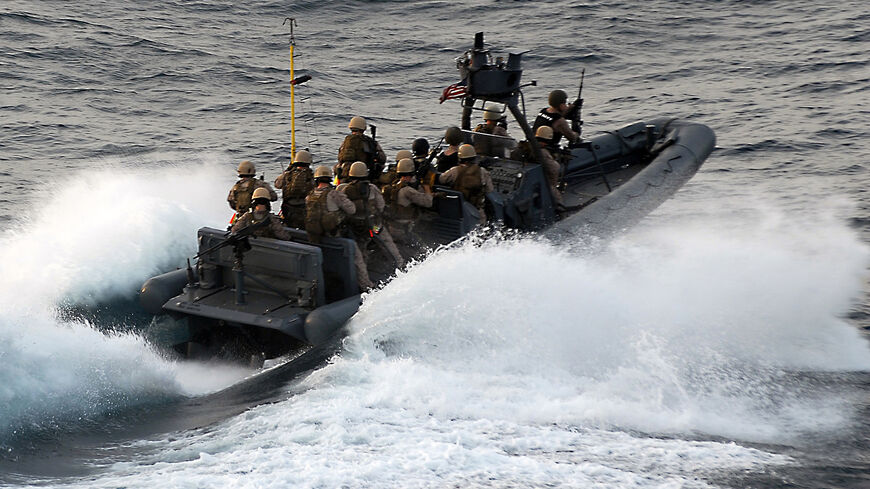WASHINGTON — The US military has devised a plan to deploy Marines and Navy personnel onboard commercial tanker vessels in the Persian Gulf region to deter seizure attempts by Iran.
A contingent of US Marines has already arrived in Bahrain and begun training for the proposed mission ahead of the expected arrival of a Marine Expeditionary Unit later this week, a US official confirmed to Al-Monitor on Thursday.
The plan, first reported by the Associated Press, does not yet have full authorization from the Biden administration and will first require diplomatic agreements with foreign governments as well as voluntary requests from shipping companies, Al-Monitor's sources said.
If fully approved by the White House, the broader proposal would leverage the military's existing self-defense authorities to enable the Marines, backed up by US warplanes and Navy ships, to protect civilian tankers flying flags other than those of the United States and its allies, officials briefed on the discussions told Al-Monitor.
The US Navy’s Fifth Fleet, which is based in Bahrain, has already briefed commercial shipping representatives on the plan.
What this means: Top US military brass are getting creative with plans to deter Iranian naval forces from a renewed spate of attempts to seize commercial oil tankers in Gulf waterways.
Iran's regular navy and the IRGC have attempted to seize at least five variously flagged tankers in Gulf waterways since the US government redoubled its efforts to enforce sanctions on the country's oil exports earlier this year.
"There's a vulnerability that Iran is trying to exploit, and is exploiting with these seizures," one American official said.
In April, Iranian navy commandos fast-roped onto the deck and seized control of a Marshall Islands-flagged tanker in international waters in the Gulf of Oman. The Advantage Sweet, a Chinese-owned, Chevron-chartered vessel, had been bound for Houston carrying Kuwaiti crude oil.
The US Navy said following the incident that it had received a distress call from the Advantage Sweet and that it was "monitoring the situation." International law forbids military forces from boarding a ship without permission from the government of the flag it is flying.
The seizure by Iran came in retaliation for the US Justice Department's successful effort to persuade the owners of another tanker, the Suez Rajan, to redirect that ship to the United States and surrender its cargo of sanctioned Iranian oil bound for China, US officials said.
Less than a week later, the IRGC navy seized a Greek-managed, Panama-flagged tanker, the Niovi, as it transited between the Emirati ports of Fujairah and Abu Dhabi, prompting Emirati officials to complain to US counterparts.
The White House announced an increase of US and allied maritime patrols in and around the Strait of Hormuz in mid-May in response to the incidents.
A turning point came in early July, however, when the presence of the USS McFaul thwarted three apparently separate attempts by Iranian ships to seize different commercial tankers in the Strait of Hormuz and Gulf of Oman within roughly 12 hours.
In one of those incidents, the crew of an Iranian vessel opened fire with live ammunition on a Bahamas-flagged, Chevron-chartered tanker – the Richmond Voyager – which had refused radio orders to stop off the coast of Oman.
The Pentagon's former top policy chief, Colin Kahl, said early last month prior to his scheduled departure from the role that there would be more to come. “Whatever the Iranians are trying to do here, I don’t think we should assume it’ll be the last time they try,” he said.
The United States has deployed Air Force F-16s, a dozen high-end F-35 Joint Strike Fighters and a third Navy guided-missile destroyer in recent weeks to bolster joint patrols around the Strait of Hormuz, through which roughly a fifth of the world's oil supply flows.
The 26th Marine Expeditionary Unit and accompanying USS Carter Hall and USS Bataan are expected to arrive in Bahrain by early next week.
“It’s not about adding more forces to the region; it’s what you do with those forces,” said the US official, who like the others cited in this story spoke on strict condition of anonymity to discuss internal planning.
Widening the aperture: The US military is only authorized to use force in Gulf waterways when acting in self-defense or when protecting ships flying the flag of countries with which Washington maintains prior defense agreements, including Saudi Arabia and the United Arab Emirates.
Pentagon officials have been in talks with President Joe Biden's National Security Council over a proposal to build upon such bilateral agreements to apply collective self-defense to commercial vessels based on criteria other than national flags, potentially including ownership of the ship or its cargo, six officials briefed on the discussions told Al-Monitor.
"It's about getting a sign of their buy-in, and they have granted it," the aforementioned official said.
John Kirby, the NSC's strategic communications coordinator, told Al-Monitor late last week he was not familiar with the Pentagon's request, but said the administration "would be inclined" to grant Defense Secretary Lloyd Austin broader authorities if he felt he needed them to ensure maritime security in the Persian Gulf.
"In terms of what their rules of engagement are or how they're going to be used, that's really a question better put to DOD," Kirby told reporters on Thursday.
As the Pentagon's vision for the mission takes shape, the US forces deployed to the region — including recently arrived F-16 and F-35 aircraft — are expected to fall under the command of the US Navy's Fifth Fleet in Bahrain.
Kirsten Fontenrose, a senior fellow at the Washington, DC-based Atlantic Council and a former senior director for the Persian Gulf at the White House’s National Security Council, told Al-Monitor Pentagon's proposal offers the Biden administrtion an opportunity.
“It would be a phenomenal deterrent,” Fontenrose said.
“Granting the authority to use force if something is under attack is one thing, but when you say, ‘even if it's a threat of seizure,’ that's a far stronger deterrent.”
Yes, but... Key details of the Pentagon's proposal have yet to be finalized, including whether the White House may delegate to US military commanders in the region the authority to approve the use of force against Iranian ships without first obtaining direct permission from Washington. "There is an open request on that," one US official confirmed.
Current and former senior national security officials expressed skepticism. "I don’t see this administration as willing to take the risk," one formal senior Defense Department official told Al-Monitor, adding that such a decision would be "outside of this administration’s culture."
Memories are still fresh within the White House and Pentagon of the Trump administration's mercurial approach to confronting Iran.
"The risk the NSC will have to seriously weigh is that using the authority without checking up the chain with policy could spark a larger conflict," Fontenrose suggested.
US officials briefed on the new authorization requests emphasized they were designed to deter rather than to escalate, and stressed that any display of force would be subject to strict rules of engagement.
“Delegating down any authorities increases the likelihood that they will be used," said Brian Finucane, a senior advisor at the International Crisis Group and former State Department legal adviser on military and counterterrorism affairs.
"This could potentially set up a scenario like that of the tanker wars of the 1980s," Finucane suggested. "The domestic legal basis for this is far from clear."
Strategic significance: Iran's seizures of civilian tankers and attacks on Gulf neighbors have driven a wedge into the decades-long strategic ties between the United States and Arab states, officials say.
The United Arab Emirates announced it would stop participating in a major US-led maritime security coalition in May following the IRGC's seizure of the Niovi. Iranian navy chief Rear Adm. Shahram Irani announced just a few days later that his country would form a naval alliance with the UAE and other countries, drawing incredulous reactions from US military officials.
Expanding collective defense agreements to commercial shipping could be a first step toward satisfying longstanding security demands by Saudi Arabia and the UAE without forcing the Biden administration into formal Article 5-style obligations that would be unlikely to receive the necessary approval in Congress.
Riyadh has moreover linked its requests for formal US defense guarantees to the Biden administration's priority of seeing Saudi Arabia normalize ties with Israel.
If the administration can use the Pentagon's maritime defense proposal as part of wider security offer to Saudi Arabia in exchange normalization with Israel, that could help it gain full approval in the White House, Fontenrose said.
What's next: The Biden administration cleared the maritime defense proposal for diplomatic engagement late last week, Al-Monitor's sources said.
US Fifth Fleet commander Vice Adm. Brad Cooper met with Gulf Cooperation Council officials in Riyadh on Thursday to discuss "maritime collaboration for ensuring the free flow of global commerce in and near critical regional waterways," according to the Navy.
Know more: Two US officials speaking on the condition of anonymity said the Justice Department moved to confiscate a second tanker carrying Iranian petroleum several days prior to Iran's attempted hijackings off the coast of Oman in early July.
That US seizure has not yet been reported. It remains unconfirmed whether Iran's actions off the coast of Oman were directly related.
A few days later, following a visit by Iranian President Ebrahim Raisi to Jakarta, Indonesian authorities seized an Iranian-flagged tanker accused of conducting an illegal ship-to-ship transfer in the waters of its exclusive economic zone.
A spokesperson for Iran’s diplomatic mission to the United Nations declined to confirm either of those seizures in an emailed statement to Al-Monitor.
"We do continue to vigorously enforce our sanctions on Iran. We don’t hesitate to take action against sanctions evaders," State Department spokesperson Matthew Miller said following Raisi's visit.








